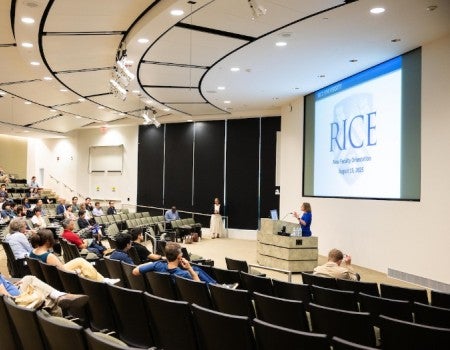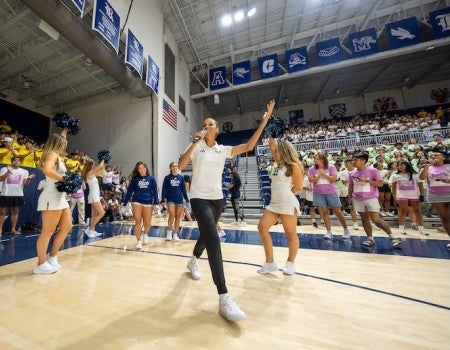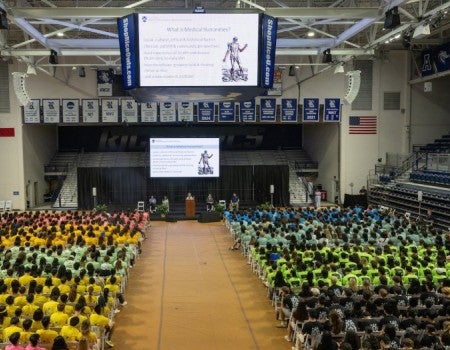

Cherukuri named Rice University’s first vice president for innovation
Paul Cherukuri, the executive director of the Institute of Biosciences and Bioengineering, has been named Rice University’s first vice president for innovation.

Members of the Rice community gathered to celebrate Paul Padley....

The honors reflect both the technical ambition of “SPILL” and the artistry of its creative team. ...

Rice scientists have discovered that tiny creases in two-dimensional materials can control electrons’ spin with record precision, opening the path to ...

Rice’s Office of Technology Transfer has entered into a subscription agreement with Intel Corporation which will enable the global technology leader t...

Just like incoming freshmen are getting to know the Rice campus during O-Week, newly hired faculty spent two days in an orientation of their own befor...
A team of materials scientists at Rice has developed a new way to grow ultrathin semiconductors directly onto electronic components....

New flocks of Owls filled Tudor Fieldhouse with chants, signs and competitive spirit as they represented their residential colleges and cheered on Ric...

After more than a decade of outstanding leadership at Rice, Paul Cherukuri, the university’s top innovation executive, will be leaving his post to acc...

A team of researchers at Rice has developed MIST — Mineral Identification by Stoichiometry — the first online tool capable of automatically identifyin...

A collaboration between Rice, Baylor College of Medicine and Texas Children’s Hospital’s Jan and Dan Duncan Neurological Research Institute (NRI) has ...

On the second morning of O-Week, Rice’s Class of 2029 assembled in Tudor Fieldhouse to hear advice from professors who shared their academic experienc...

The Owls move to 2-0 early in the 2025 season after a 6-0 shutout win over UTRGV....

Cherukuri named Rice University’s first vice president for innovation
Paul Cherukuri, the executive director of the Institute of Biosciences and Bioengineering, has been named Rice University’s first vice president for innovation.

Most but not all Texas coaches say they’ll plan for climate change
A survey of Texas college and high school coaches, trainers and athletic directors suggests many are not taking climate change into account as they plan their programs’ futures.

VegSense makes sense for forest studies
Rice ecologists have created open-source software to rapidly gather field data with Microsoft’s mixed reality headset.

Next-generation networks with fast changes and increased security
Rice computer scientists are leading the development of programmable networks that respond to change in seconds without downtime.

Ken Kennedy Institute will host AI in Health Conference Nov. 7-9
Rice's Ken Kennedy Institute is organizing and hosting the AI in Health Conference Nov. 7-9 at the BioScience Research Collaborative.

Interns bring innovative design to health technology engineering challenges
Rice University’s Rice360 Institute for Global Health Technologies and Oshman Engineering Design Kitchen (OEDK) this summer merged two internship programs and brought together 17 students over the course of seven weeks to employ inventive engineering design methods tackling health technology challenges.

Ramesh named Rice University’s vice president for research
Ramamoorthy Ramesh, a condensed matter physicist and materials scientist with more than 25 years in academia, industry, national labs and government service, has been named Rice University’s vice president for research.

OwlSpark, Rice University’s high-growth tech startup accelerator, is celebrating 10 years of facilitating entrepreneurship and its 10th cohort, along with debuting the inaugural class of the small business accelerator BlueLaunch, which is focused on growing ventures of any industry.

Caring for loved ones with dementia is stressful. Rice researchers aim to help.
Providing care for people with dementia is a physically demanding and emotionally taxing job that often falls upon loved ones, whose own health can suffer as a result.

Even if they’ve never served time in prison, people who have felony convictions still have difficulty accessing stable housing, according to new research from a Rice University sociologist.